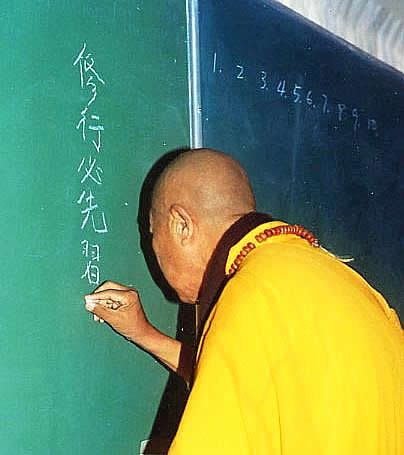 |
|
The Master's Unprecedented
Matching Couplets Class
The art of matching couplets is a singularly special style in Chinese literature," commented Upasaka Liu, the Master's Teaching Assistant in his Matching Couplets class. "When the matches are perfect, the metaphorical meanings are deep and far-reaching and the beauty and wonder of the Chinese language is thoroughly revealed. The method by which it is revealed is in matching the upper and lower lines--so they fit together and are related. Particularly, phrases of only a few words are able to communicate many inner feelings."
The Master's Matching Couplets class began back in the l970's at Gold Mountain Dhyana Monastery. A disciple commented:
Of the 84,000 Dharma-doors, one of the most wonderful is completing the second line of a couplet. This practice, a fine art in China, is learned through much study and meditation. Teachers can use this method to inspire and lead students to awaken to their original wisdom. At Gold Mountain Dhyana Monastery, the Master teaches a weekly Couplets class. A good match not only completes the meaning of the first line, but is written so that the meaning, tone, and style are matched character for character. Thus, the first and second lines, although complete in themselves, also are paired to make sense as a whole. This is the first time this Dharma has been taught in the West.
By l980, Matching Couplets class was an important event in life at the City of Ten Thousand Buddhas and was a core course in the Dharma Realm Buddhist University curriculum. Upasaka Liu comments, "The method of matching couplets appears to be simple and easy, but actually it's not easy. It's hard to make a good match. If the one composing it lacks scholarship, then the couplet will be too simplistic. If he lacks character, the couplet will be weak. If he lacks feelings, then the couplet will be insubstantial. If he lacks literary skill, then the couplet will be quite ordinary. Without both erudition and lofty character, it is difficult to soar to the sphere of refined literary genius... And so matching couplets is the most exquisite among all of China's exquisite literary forms."
"What a shame that currently the art is declining and those who really have talent in making couplets are rarer than phoenix feathers and unicorn horns! And so how fortunate that now the Master is teaching this unprecedented class in which Westerns and Asians can learn about the ancient Chinese art of matching couplets. The Master's ingenious method of teaching is a gradual approach. As an expert, he makes it simple, and Western and Asian students alike have become seriously interested in this art."
And of course Couplets class was more than just study of a literary form. The content of the couplets always contained principles that were proper and timely. Buddhist doctrines, terms, and lists were succinctly expressed in brief phrases of the couplets. Confucian concepts of how to be a good person and how to relate to and benefit the family, society, and all nations were introduced in the brief wording of the couplets.
One of the Master's lines, composed in l980 when he was traveling back and forth between San Francisco's Gold Mountain and the City of Ten Thousand Buddhas at least twice weekly, reveals so well the Master's dedication to education that was so intense that he continually sacrificed his own health and comfort to nurture and support it. The line goes like this:
Today, riding in a car flying back to the City, I came especially for the sake of tomorrow, to listen attentively to Professor Cheng teach his class, so that later in the future I can establish myself and practice the Way, thus developing a good foundation.
In the couplets below, each word in bold face represents the translation of the Chinese characters in each line of the couplet. The other words are grammatical necessities in English. Analyzing the couplets, the first and second lines' matching words, the parts of speech and grammatical functions in English are shown on the charts.
Proper nouns are matched with proper nouns; common nouns with common nouns; adjectives with adjectives and verbs with verbs. In addition, the grammatical functions in the two sentences of the couplet must match, and no word in the first line can be repeated in the match. Now let's look at some of the Master's own couplets and analyze the grammar. It should be mentioned that the rhyming system involving the sounds and tones used in Chinese couplets is beyond the scope of the discussion that follows.
Couplet on the Mountain Gate of the City of Ten Thousand Buddhas
(on the west side seen upon entering)
composed by the Master on May 4, 1980
The expansive scope of the Flower Adornment,
the Shurangama's entire platform,
and the forty-two hands and eyes
pinion the heavens and secure the earth.The World Honored Ones with wonderful enlightenment,
Equal Enlightenment Bodhisattvas,
and hundreds of billions of transformation bodies
take seas and turn them into mountains.Analysis:
